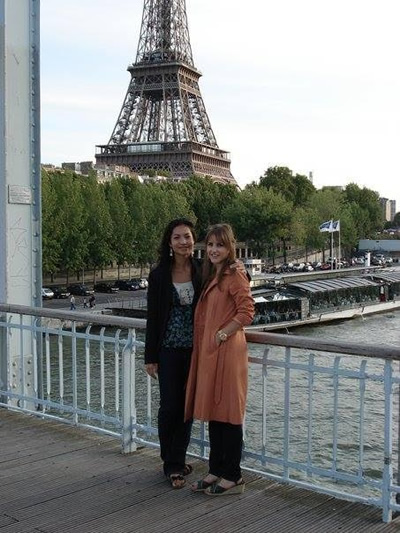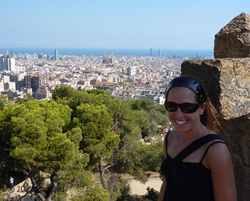From Student to Teacher
How an American Teen Became a French Citizen
An Interview by Stacey Ebert
Published 3/3/2016
 |
| Enjoying Paris with her best friend from college, Leakhena Moeur, in 2006. Photo credit Dani Marino. |
To this day, she is one of the most gifted students I’ve ever taught. When her parents came to speak to me about her class work at parent-teacher conferences, I told them that "she is an outside-of-the-box thinker," "she’s light years ahead of her peers," "and she’s exceptionally creative and gifted." Whatever it may mean to be the "typical student," that she was not. By the time she was a high school junior, she was drawn towards a foreign language and the people, culture, and land where it is spoken. Since then, she’s never once looked back.
As her 9th-grade global history teacher, I'm thrilled she’s out in the world, living her dream and making cultural diffusion a reality. As a traveler, I’m excited that she’s seized opportunities to see new sights, meet new people, and experience another way of living. As someone who lived abroad, I’m inspired by her desire to blend cultures, become a local, and attain the goal of becoming a dual citizen. Dani has most certainly "transitioned abroad." Here, she shares her story and advice for those on a similar journey.
Stacey Ebert: When and how did you know you were interested in studying in France?
Dani: I knew by the end of year eleven that I wanted to study in France. I had just returned home from a vacation in Paris (which was my 16th birthday gift.) Those nine days in Paris left me wanting more. I thought about studying abroad but I felt a semester or even a year wouldn’t be enough. I wanted to learn the language and the culture from the inside out — really “live” there. So I started looking into ways I could go and study there on a long-term basis.
 |
| A view of Notre Dame in Paris. |
S.E: What made you choose the American University in Paris for your studies?
Dani: I found the American University in Paris (AUP) while trolling the internet for ways to get back to Paris. It seemed the perfect fit because at the time I didn’t speak fluent French (so I couldn’t go to a French college) and I still wanted an American degree. The courses were all international focused (which was important to me). The campus location is right in the heart of Paris. It ticked all the boxes.
S.E: How would you describe the transition from American student in the U.S. to American student in France?
Dani: Because I was in an “American university,” the system was familiar — the style of classes, the teaching methods etc. What was different was that I found myself in classes with students from over 90 different countries (some which, I was naively/ignorantly unable to place on a map.) The diversity made the learning experience enriching — everyone brought a different perspective to the table. It was mostly outside the classroom that I felt the real difference, because I was obviously a foreigner. That feeling was very unfamiliar to me and took time to get used to. I may still be getting used to it all these years later.
S.E: What made you decide to stay in Paris after graduating university?
Dani: I had already started to plot my next steps after college by the end of sophomore year. I thought to myself “wow it’s already half over… that went by fast!” I was afraid that I’d be left wanting more, or that I wasn’t going to be completely done with my experience abroad after graduation. I started to look into internships, which eventually, and luckily, lead to my first full-time position (and a work visa).
S.E: What did you miss about being out of your home country? What did you feel you gained by staying abroad to study and then live after graduation?
Dani: Of course, I miss my family and friends. I often feel like I’m “missing out” since I can’t be there for some important events, or even just the day-to-day things. But, the friends that have remained close over the years, regardless of how long or how many miles have separated us, are the ones I’ll probably have forever. I also miss how things can be so efficient and easy at ‘home’. There’s a French saying “why make it simple when it can be complicated”. Everything here seems complicated and can take twice as long. It’s very frustrating but also part of the learning process — how to deal. What I’ve gained? There’s probably not enough room to write about it all. But I think, most importantly, is having a different perspective, a different outlook on everything just because I’ve seen things from another angle. Not every place is like the US (but as Americans, we tend to fall into that trap). Living abroad has taught me that there are other ways of doing things, other opinions, other ways of living that are different, sometimes better sometimes not, but, that’s what’s interesting. And more concretely, now that I’m bilingual and have dual-citizenship, I do believe it can/will open many doors.
S.E: In the past ten years you’ve now lived abroad, how has your view of being an expat changed?
Dani: I never really felt like I belonged to an "expat community." I think it’s because I arrived here as a student and by the time I started working I felt quite ‘integrated’ into the system. I don’t know if it’s changed really, but, I know that the longer I stay the less people consider me "an expat." Technically I am French now, and people don’t pick up on my accent right away. So the expat label isn’t as obvious. I’m often torn between wanting people to know I’m not from here (I’m from NY!). I guess it is to set myself apart, yet I also want to fit in (I’m French too now!). I think it’s an expat paradox.
S.E: What advice would you offer to high-school students today in terms of choosing a program abroad? Would you suggest university study or a shorter-term program?
Dani: It really depends on the individual, their intentions and motivation. I knew that one semester would not have been enough for me. I was drawn to France immediately and knew it wasn’t going to be a fling but rather a long-term relationship. However, it’s definitely not for everyone. I know a lot of students who called it quits and went back after one semester/one year because they didn’t adjust as well and couldn’t imagine years of this. There’s a lot of hurdles, frustrations and also times of loneliness. If that outweighs the reasons you’re abroad or the good times, then you’re not going to stay. If the student is really dedicated to learning the language, the culture, and the way of life, then I think university study is a definite option.
S.E: How do you feel you’ve grown as an individual by being an expat?
Dani: As an individual I think living abroad forced me to grow up faster. I had to deal with things that even once you graduate from college you don’t deal with (trying to get a job with no visa, renting an apartment when you can’t read the lease…etc). Because there’s no one to really fall back on, you have to rely on yourself and the art of “debrouille” — which means "taking care of things/managing things” on my own. I could call up my parents to complain but they couldn’t come and help. After going through so many ‘battle’s and hurdles, you don’t sweat the small stuff. In the end, it has helped me realize I can accomplish anything.
S.E: How much of your time is spent in an expat community as opposed to with French nationals?
Dani: When I was at school I was with other international students, but I was also one of the few people who had French friends outside of classes. Once I started to work, all my coworkers, many whom became my friends, were French. I do have a few international/expat acquaintances. They’re people I tend to ‘click’ with quickly, because there’s nothing like meeting someone who has gone through the same experiences as you have as a foreigner. There’s just a sense of empathy on a level that another French local could never understand.
S.E: What have you grown to love about living in Paris in the past decade? What has been difficult for you about living abroad?
Dani: I’ve grown to love that I live in one of the most beautiful cities in the world with such a rich culture. I can easily travel to Italy, Spain, London and many other places on a weekend or a whim. There’s so much in such short reach. While sometimes it’s frustrating that things run on a slower pace here (at least compared to NY), it’s also nice that relaxing, taking it easy, or taking one hour for lunch is perfectly normal...if not welcomed. The most difficult is probably dealing with "the system" here. As an expat, you don’t know the ins and outs, or worse, the language. France is complicated as it is, and even some French people have a hard time getting through bureaucracy. As a foreigner, you add another layer of cluelessness, complexity, and frustration. There’s so much paperwork and red tape to get through for everything. Along the way, people aren’t always as friendly and helpful as you’d wish. The notion of service, or ‘the customer is always right’ is the opposite here. You have to deal with attitudes and a lot of negativity. As an American, it can really get you down since we’ve been taught to have that “can-do” positive attitude.
S.E: If you had to do it again, would you still choose to live abroad? Would you still choose Paris?
Dani: Without hesitation — yes. I would do it again and I would choose Paris. I believe it was part of my life’s path to come here.
S.E: How have you found life abroad different from those of your friends who remained stateside?
Dani: Although I was in an “American University” I definitely didn’t have the "typical" American campus experience. We didn’t have Fraternities or Sororities, football games, or just regular campus life. At 18 I had my own apartment, had to worry about paying bills, taxes, visas, etc. On the other hand, I was able to go to Morocco for Spring break, become friends with people from Cambodia to Kuwait to Mauritius, and eat as much French baguette as I wanted. Early on, the difference in experiences created a gap between some of my friends back home. I had been through, seen and done things that were hard to relate to. I sometimes feel like a snob saying things like “well in Paris we have…”
S.E: Is there anything you wish you knew about the ‘transition’ before taking the plunge?
Dani: Once I knew I was moving to France for school I started reading a lot about expat life, especially for Americans living in France. Since I was so eager to go there I just started reading anything I could get my hands on to prepare myself. I was aware of the “honeymoon phase” when everything is wonderful and charming, but that reality would eventually set it and that could be a depressing time when you feel homesick and wonder why you’re even there. Now that the initial ‘plunge’ is long behind me, I would say that making a real effort to learn the language is the best advice. Without it, you’ll feel (even more) unequipped to deal with things, and you’re depriving yourself of meeting ‘locals’ or getting an insider view of the culture — which is the best part. Learning the language is a long road and it never ends. I’m still learning words or expressions and people often correct my pronunciation and grammar. You have to get over the initial embarrassment or apprehension about making mistakes. Most people will appreciate that you’re making an effort and will be kind.
S.E: What made you want to become a French citizen?
Dani: The French won’t like to hear this, since it’s not the most patriotic of answers, but one of the main reasons why I wanted to become French was to facilitate my life. After 10 years of visa renewals – which, as most expats would agree, is exhausting — I didn’t want to have to constantly worry about my legal status. Also, when you’re not a citizen you have to constantly "prove" yourself – who you are, why you’re here… a landlord won’t trust a foreigner as much as a French person, an employer will ask for more paperwork etc. Plus, I wanted to have the option to leave France for a period of time (after 6 months you lose your visa) and then have the option to come back if I chose. Dual citizenship also grants me access to live and work anywhere in Europe. After all the time I had spent learning the language and learning to integrate, French citizenship seemed like the next and maybe ultimate step.
S.E: How has your family and friend’s reaction to your living abroad changed over the years?
Dani: At first my family had the obvious reaction — they boycotted the idea. Why would I go all the way to France when we have great schools at home? I had to run a campaign to convince them. Eventually they came around and since then have been extremely supportive of my decision. After the first few years they even realized how beneficial it was for my education. It hasn’t been easy though, as we don’t get to see each other often. Living abroad also gave my family and friends the opportunity to come visit me in Paris, and even travel nearby. My parents would never say it but they are still secretly waiting for me to come home. My friends would probably like that too.
 |
Stacey Ebert, is a traveler at heart who met her Australian-born husband while on a trip to New Zealand. Stacey was an extracurricular advisor and taught history in a Long Island public high school for over fifteen years, enjoying formal and informal educational practices. After a one-year round-the-world honeymoon and significant long-term travel, travel and its many gifts changed her perspective. She has since left the educational world to focus on writing and travel. She is energetic and enthusiastic about long-term travel, finding what makes you happy, and making the leap. In her spare time, she is an event planner, yogi, and dark chocolate lover, and she spends as much time as possible with her toes in the sand.Check out her website at thegiftoftravel.wordpress.com for more of her travel musings. |
|
